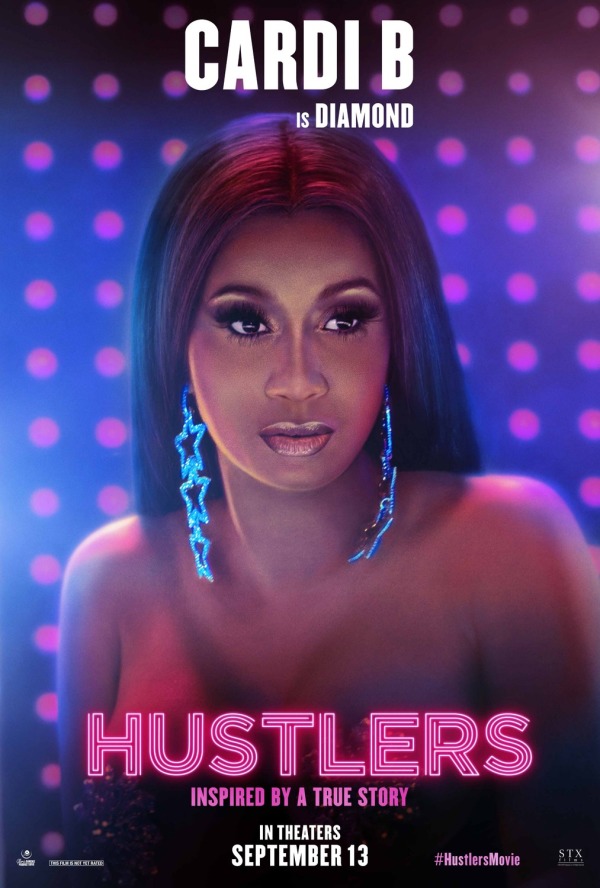HUSTLERS (Directed by Lorene Scafaria, 110 minutes, 2019, USA)
 BY SOPHIE BURKHOLDER Any movie that includes Jennifer Lopez pole-dancing to Fiona Apple’s “Criminal” is a must-see in my mind. In this early scene of Hustlers, Lopez, who plays Ramona, lands multiple splits on her way down from the pole, sweeping piles of cash in towards her as she says, “Doesn’t money make you horny?” Ramona, a notable dancer at the Manhattan club Moves, directs her question to fellow employee Dorothy (stage named Destiny), played by an endearing Constance Wu, who soon finds herself in a mother-daughter-like friendship with Ramona. Opening her billowing fur coat up to Dorothy as she smokes a cigarette on the club’s roof later that night, Ramona promises to show her the ropes, which in this movie means learning how to toe the line of getting clients just drunk enough to sign off on exorbitant credit card bills — of which the girls get a portion.
BY SOPHIE BURKHOLDER Any movie that includes Jennifer Lopez pole-dancing to Fiona Apple’s “Criminal” is a must-see in my mind. In this early scene of Hustlers, Lopez, who plays Ramona, lands multiple splits on her way down from the pole, sweeping piles of cash in towards her as she says, “Doesn’t money make you horny?” Ramona, a notable dancer at the Manhattan club Moves, directs her question to fellow employee Dorothy (stage named Destiny), played by an endearing Constance Wu, who soon finds herself in a mother-daughter-like friendship with Ramona. Opening her billowing fur coat up to Dorothy as she smokes a cigarette on the club’s roof later that night, Ramona promises to show her the ropes, which in this movie means learning how to toe the line of getting clients just drunk enough to sign off on exorbitant credit card bills — of which the girls get a portion.
Based on a true story by writer Jessica Pressler in New York Magazine in 2015, Hustlers tells the tale of a sex worker’s game gone wrong. In the wake of the 2008 recession, Dorothy and Ramona go from making thousands of dollars every night with fellow Move dancers played by the likes of Lizzo, Cardi B, and Trace Lysette, to working day jobs in retail and desperately calling old clients out of the blue in the hopes of a lucrative rendezvous. Their only option in this economic desperation is to “go fishing.”
After a brief stint in the friendship when Dorothy leaves Moves to have a baby, she and Ramona reunite as they begin to “fish” for men at restaurants around the city, enticing new ones every night to return to the club with them, where they get a cut of the profits. The game gets riskier when Dorothy and Ramona join forces with Mercedes (Keke Palmer) and Annabelle (Lili Reinhart), and begin drugging their clients with a combination dose of ketamine and MDMA, to help ensure the men have little memory of the prior night’s high-dollar bender and hide the girls’ ever-growing plunder.
But the structure of this film isn’t one of a typical heist story. Instead, we see much of it unfold in the form of flashbacks as Dorothy recounts tales of credit-card-draining drugged-up nights to a reporter, Elizabeth, played by Julia Stiles. Though this detachment aids in the emphasis of the reality behind this movie, it also keeps viewers at a distance from the interpersonal relationships of the film by presenting the story through only one, potentially unreliable, point of view. As Dorothy cries and tells joyous stories of extravagant Christmas parties when the gang was on top of the world, Elizabeth repeatedly reels her back in with a sharp focus on the group’s illicit drugging of unknowing men.
Thus, we hear the story in past tense, knowing this won’t end well. The interview-like shape of the story often leaves deeper relationships between Dorothy and Ramona, Dorothy and her grandmother, and Dorothy and her baby’s father, largely half-baked. We have glimpses of the intricacies behind them in some moments, as when Dorothy chooses to take a plea bargain to evade jail time for the sake of her baby, crying with Ramona as she repeats an earlier line of the movie, “motherhood is a mental illness.” But underneath the smiles, tears, happiness, and humiliation in the movie is the sense that these friendships might only be based on a mutual love of luxury goods. When business is booming, the girls shower each other with chinchilla coats, Louboutin heels, and bags that probably cost more than some cars.
Despite its shortcomings, the movie is nonetheless groundbreaking. Some sex workers bemoan the way that Hustlers still perpetuates many toxic tropes of the industry, and take issue with director Lorene Scafaria neglecting to compensate the IRL strippers for the upaid vacation forced upon them when the production took over their work place for a week of location shooting. But the movie also eliminates nearly every male voice from narration, a rarity in Hollywood, and boasts one of the most diverse casts of the year, with two women of color taking the lead roles — an even bigger rarity.
For Hustlers to be as revolutionary as so many viewers want it to be, however, the film needs to hone in on the emotional complexities of being a sex worker, a lifestyle unbeknownst to most moviegoers. The scene where Dorothy performs oral sex on a customer only to be paid a third of the agreed upon price is a missed opportunity to unpack the occupational hazards of sex work. Also, the dichotomy between the deep emotional bonds the girls share and the callous disregard with which they treat their customers goes largely unexplored apart from a few quipped lines of “I just don’t want anyone to get hurt.” And although the feel-good qualities of the movie — like Usher’s euphoric visit to the club one night — can easily bury its faults by the time the credits roll, we should do our best to recognize Hustlers for what it is: a good start.

